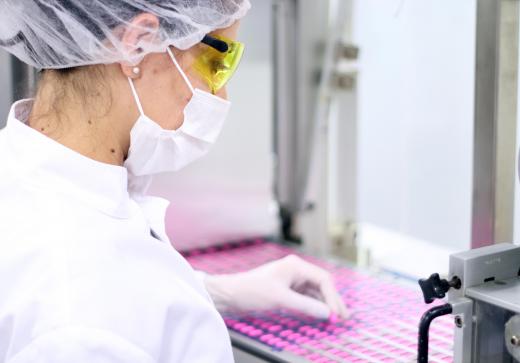At AboutMechanics, we're committed to delivering accurate, trustworthy information. Our expert-authored content is rigorously fact-checked and sourced from credible authorities. Discover how we uphold the highest standards in providing you with reliable knowledge.
What is Process Manufacturing?
When defining manufacturing procedures and methods, there are two essential terms to keep in mind: process manufacturing, and discrete manufacturing. Process manufacturing results in finished goods that cannot be disassembled back into their original components. Discrete manufacturing, on the other hand, results in finished goods that can be disassembled back into the original components.
Examples of products made by process manufacturing include paint and coatings, gasoline and diesel fuel, processed foods, pharmaceutical products, and canned or bottled soda. Examples of products made by discrete manufacturing include automobiles, computers, televisions, boats, and machinery. Essentially, goods produced from process manufacturing techniques are blended, while those produced from discrete manufacturing are assembled. Thus, process manufacturing is ordinarily conducted using proportional formulas and recipes, while discrete manufacturing is accomplished using bills of material and instructions, i.e. blueprints, drawings, etc.

Chemical manufacturing, gasoline manufacturing—commonly known as refining—processed food manufacturing, beverage manufacturing, all are industries utilizing process manufacturing to produce a finished product. The automobile industry, the computer industry, and the aerospace industry each utilize discrete manufacturing to produce finished goods. As can be inferred, some components of certain products made with discrete manufacturing are produced through process manufacturing. The plastic components in an automobile, for example, are manufactured by a blending of chemicals according to a proportional formula.

Obviously, the reverse is not true. Attempting to blend a few leather bucket seats, several vinyl armrests, and a number of plastic fan blades will not yield a five-gallon (18.93-liter) (4.16-gallon-U.K.) bucket of paint. If enough heat were applied to the above components, a processed product would result, but certainly not paint.
Another significant difference between the major manufacturing disciplines is in inventory terminology. Processed goods are a result of the blending of raw materials, ordinarily inventoried in bulk. Discretely manufactured goods are a result of the assembly of parts, inventoried as items, or units. As well, process manufacturing effects a chemical change in ingredients resulting in either a solid or a liquid. Discrete manufacturing, conversely, effects a structural change in components resulting solely in a solid item. Inventory of finished goods can thereby be seen as a method for distinguishing between processed products and discretely manufactured products.

There are several other considerations in discerning the two major manufacturing methods and procedures, including packaging recipes, and proportional differences in manufacturing procedures. There are even major differences in the software used to effect manufacturing methods, as well as accounting practices, between these two disciplines. About the only thing these manufacturing methods have in common is that both realize a profit gained from the manufacture of a finished product.
AS FEATURED ON:
AS FEATURED ON:














Discussion Comments
How is the inventory controlled in process industries (chemical, detergents (soap), paper companies in the ERP system with respect to the asset value on 100 percent probability?
Post your comments